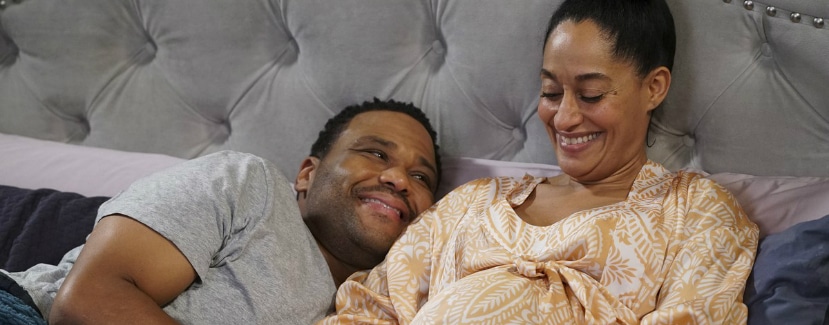ABC’s “Black-ish” is Bullish on Paternity Leave

When was the last time a popular TV show took on the issue of paternity leave at all, much less in the same episode as pregnancy discrimination? Three cheers for “black-ish” for doing just that.
Dr. Rainbow (Bow) Johnson, an anesthesiologist, and her husband Andre (Dre), an advertising exec, are expecting their fifth child. In parallel storylines, we learn that Bow has been hiding her pregnancy from the other doctors in her practice as she waits to see whether they’ll make her partner. Dre, on the other hand, has talked openly about the impending birth, but goes back and forth when his colleagues ask whether he plans to take paternity leave.
The paternity leave thread is tied to deep-rooted stereotypes about gender. Dre’s boss articulates attitudes that many employers feel even if they’re more tactful about how they say it: “The whole paternity thing – it’s not real. There’s nothing a man can do to help a woman with a baby. He can’t nurse, he can’t go to doctor’s appointments. What’s a man going to do with a baby, hold it? What would that even look like?”
Dre hasn’t thought about taking leave, and notes that he didn’t with his other kids. But he realizes that the child he’s closest to is his first-born, the only one he did spend time with when she was an infant because he was unemployed. Dre feels a pull to re-create that bond with the new baby. After he informs the team, his boss weighs in again: “If paternity leave is so great, why wouldn’t everyone take it?”
Dre’s response: “Around the world they do.” In fact, the U.S. is one of only two countries that guarantee zero weeks of paid leave. Studies show that men who take parental leave have closer bonds to their children than those who do not take leave.
But Dre has second thoughts when his boss starts handing out Dre’ accounts to the other team members. The HR representative is present – she’s reprimanded the boss for referring to paternity leave as “bitch stuff” in an email to staff. And clearly she’s reminded him of his management responsibility. The boss dutifully informs Dre, “you may take paternity leave.”
“Thank you,” Dre says, “for doing what is legally required of you.”
The sight of those accounts being taken away, however, sends the opposite message: “Yes, you have the right to take leave – and boy will you be sorry if you do.” Even when company or public policy requires leave, workplace culture too often gets in the way, as this episode so accurately portrays.
Dre changes his mind. He also feels the need to defend his manhood after a homophobic remark from the boss’s son. Dre tells the others, “You think I’m going to trade in my livelihood to change dirty diapers? I am a man.” The title of the episode is “Manternity.”
But Dre rethinks the decision once more when he hears his wife talk about firing Vivian, “Black Nanny,” because “she went and got herself pregnant…. How can she do this to me? She’s so selfish.” The nanny uses exactly the same words to describe her pregnancy as Bow uses with the partners at work: “Being pregnant is an asset. It makes you loyal. It won’t interfere with my schedule at all. I’ll be back in 6 weeks. Pregnant women can do it all.”
Dre points out his wife’s hypocrisy: “I’m glad you’re so sensitive to a woman trying to balance her home and work life.”
Bow doesn’t get the partnership. When she asks to speak to the partners – none of whom is black – they make sure a lawyer is present. And here the resolution is less satisfactory. Not only does Bow not challenge their decision, she assures them that, thanks to the nanny, “I realized what it must be like in your shoes.” She says she wants to take on a new role: “It’s just that our society hasn’t figured out how to support pregnant women or their employers. Women should be encouraged to celebrate their pregnancies, not to hide them. The system is not going to change if it doesn’t include the participation of everyone, and I really feel like I can help with that.”
How she’s going to help isn’t spelled out.
It would have been great to see Bow go a step further, absorb the issue of class privilege and talk about what lack of support looks like for the majority of black women, including, no doubt, many staff in that hospital. Still, the insights this sitcom did share represent a welcome leap forward.